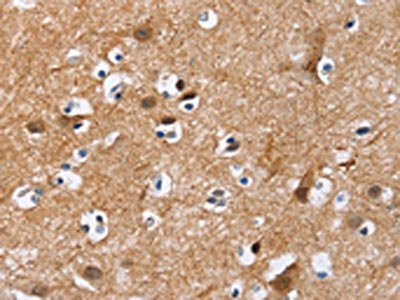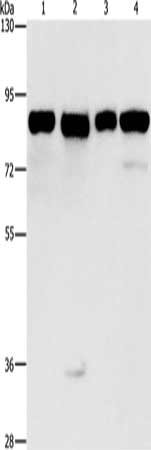MAD1L1 Antibody
-
中文名稱:MAD1L1兔多克隆抗體
-
貨號:CSB-PA133797
-
規(guī)格:¥1100
-
圖片:
-
The image on the left is immunohistochemistry of paraffin-embedded Human brain tissue using CSB-PA133797(MAD1L1 Antibody) at dilution 1/25, on the right is treated with fusion protein. (Original magnification: ×200)
-
Gel: 8%SDS-PAGE, Lysate: 40 μg, Lane 1-4: Hela cells, 231 cells, hepG2 cells, Raji cells, Primary antibody: CSB-PA133797(MAD1L1 Antibody) at dilution 1/500, Secondary antibody: Goat anti rabbit IgG at 1/8000 dilution, Exposure time: 1 second
-
-
其他:
產(chǎn)品詳情
-
Uniprot No.:
-
基因名:
-
別名:hMAD1 antibody; HsMAD1 antibody; MAD1 antibody; MAD1 mitotic arrest deficient like 1 (yeast) antibody; MAD1-like protein 1 antibody; MAD1L1 antibody; MD1L1_HUMAN antibody; Mitotic arrest deficient 1 antibody; Mitotic arrest deficient 1-like protein 1 antibody; Mitotic checkpoint MAD1 protein homolog antibody; Mitotic spindle assembly checkpoint protein MAD1 antibody; PIG9 antibody; Tax binding protein 181 antibody; Tax-binding protein 181 antibody; TP53I9 antibody; Tumor protein p53 inducible protein 9 antibody; TXBP181 antibody
-
宿主:Rabbit
-
反應(yīng)種屬:Human,Mouse
-
免疫原:Fusion protein of Human MAD1L1
-
免疫原種屬:Homo sapiens (Human)
-
標(biāo)記方式:Non-conjugated
-
抗體亞型:IgG
-
純化方式:Antigen affinity purification
-
濃度:It differs from different batches. Please contact us to confirm it.
-
保存緩沖液:-20°C, pH7.4 PBS, 0.05% NaN3, 40% Glycerol
-
產(chǎn)品提供形式:Liquid
-
應(yīng)用范圍:ELISA,WB,IHC
-
推薦稀釋比:
Application Recommended Dilution ELISA 1:2000-1:5000 WB 1:500-1:2000 IHC 1:25-1:100 -
Protocols:
-
儲存條件:Upon receipt, store at -20°C or -80°C. Avoid repeated freeze.
-
貨期:Basically, we can dispatch the products out in 1-3 working days after receiving your orders. Delivery time maybe differs from different purchasing way or location, please kindly consult your local distributors for specific delivery time.
相關(guān)產(chǎn)品
靶點(diǎn)詳情
-
功能:Component of the spindle-assembly checkpoint that prevents the onset of anaphase until all chromosomes are properly aligned at the metaphase plate. Forms a heterotetrameric complex with the closed conformation form of MAD2L1 (C-MAD2) at unattached kinetochores during prometaphase, recruits an open conformation of MAD2L1 (O-MAD2) and promotes the conversion of O-MAD2 to C-MAD2, which ensures mitotic checkpoint signaling.; Sequesters MAD2L1 in the cytoplasm preventing its function as an activator of the mitotic spindle assembly checkpoint (SAC) resulting in SAC impairment and chromosomal instability in hepatocellular carcinomas.
-
基因功能參考文獻(xiàn):
- Data suggest that LMO7 interacts with MAD1 during spindle assembly phase of mitosis; LMO7 plays role in control of mitosis progression and exerts effect on spindle assembly checkpoint; LMO7 colocalizes with actin filaments; LMO7 does not colocalize with MAD1 at kinetochores in prometaphase nor at spindle poles in metaphase. (LMO7 = LIM domain only protein-7; MAD1 = mitotic spindle assembly checkpoint protein MAD1) PMID: 29158164
- Therefore, Mps1 promotes checkpoint activation through sequentially phosphorylating Knl1, Bub1, and Mad1. This sequential multi-target phosphorylation cascade makes the checkpoint highly responsive to Mps1 and to kinetochore-microtubule attachment. PMID: 28072388
- This study showed that MAD1L1 as a susceptibility gene for both of these genetically overlapping disorders is associated with a decreased bottom-up responsiveness of the mesolimbic reward system and related cortical regions involved in the salience network as well as with reduced top-down control processes. PMID: 27184339
- Results show that low DNA methylation levels of LINC00682, MAD1L1, and LINE-2 was strongly correlated with hepatocellular carcinomas recurrence, patient disease-free survival, and/or overall survival. PMID: 26138747
- MAD1L1 positive expression may be associated with tumour progression and metastasis in small-cell lung cancer (SCLC) and may thus serve as a new biomarker for prognosis in these patients. PMID: 26499943
- In this review, we highlight a novel Mad1 role in chromosome alignment, which is the first conserved mechanism that links the spindle assembly checkpoint and kinesin-mediated chromosome gliding. PMID: 26752263
- MAD1L1 Arg558His and MAD2L1 Leu84Met interaction with smoking increase the risk of colorectal cancer PMID: 26183163
- MAD1L1 rs12666575 polymorphism may play a protective role against schizophrenia (SCZ) in the Chinese population. rs12666575 may be associated with general psychopathology and thought disturbance in SCZ patients. PMID: 26528791
- We also show that replication perturbations result in relocalization of MAD1/MAD2 in human cells, suggesting that the role of SAC in DNA repair is conserved. PMID: 25898113
- Mad1 has a role in secretion and cell migration. PMID: 25447996
- MAD1 kinetochore localization dictates the spindle assembly checkpoint in metaphase. PMID: 24695965
- This article reviews Mad1 and Mad2 - structural and functional relationship with implication in genetic diseases, specifically in cancer. [review] PMID: 24724894
- Mad1 is required for mitotic arrest even when C-Mad2 is artificially recruited to kinetochores. The C-terminal globular domain of Mad1 and conserved residues in this region are required for this unexpected function of Mad1. PMID: 24477933
- An important role of ATM-mediated Mad1 Serine 214 phosphorylation in mitosis. PMID: 24728176
- Here we demonstrate that the centromere protein CENP-I is required to generate a stable association of RZZ and Mad1 with kinetochores. PMID: 24862574
- PRAP1 is a protein interacting partner of MAD1 and that PRAP1 is able to down-regulate MAD1 and suppress mitotic checkpoint signalling in hepatocellular carcinoma. PMID: 24374861
- Mad1, in addition to converting Mad2 to its active conformation, scaffolds formation of a higher-order mitotic checkpoint complex at kinetochores. PMID: 24637323
- Results show that Mad1-Mad2 must be targeted to nuclear pore complexes (NPCs) in order to produce the premitotic Cdc20 inhibitor, which ensures that anaphase and mitotic exit are robustly coupled to the establishment and correction of kinetochore-microtubule attachments. PMID: 24581499
- Tpr is required for normal SAC response by stabilizing Mad1 and Mad2 before mitosis. PMID: 24344181
- MAD1L1 might be used as a prognostic biomarker for breast cancer and expression of MAD1L1 in nuclei is also a predict biomarker of contraindication to pacilitaxel treatment in breast cancer. PMID: 23860928
- High mad-1 expression is associated with myelodysplastic syndrome. PMID: 24095110
- These data indicate that hypoxia-induced Mad1 lowers doxorubicin-stimulated generation of reactive oxygen species through mitochondrial inhibition and subsequently contributes to tumor resistance to doxorubicin PMID: 23459071
- The polymorphism MAD1 1673 G --> A affects SAC functionality, increasing the frequency of aneuploid cells. This polymorphism modifies the response to agents that alter the dynamics of microtubules in patients with ovarian cancer PMID: 23407047
- Mad1 expression is inversely related to miR-125b expression in oral SCC tissues. PMID: 23099851
- These results suggest that levels of Mad1 must be tightly regulated to prevent aneuploidy and transformation and that Mad1 up-regulation may promote tumors and cause resistance to current therapies. PMID: 22778409
- The expression of hTERT mRNA and deletion of Mad1 protein are closely related to pathogenesis of lung cancer. PMID: 19224688
- results indicate that CTD is a part of an extensive kinetochore-binding interface of Mad1, and rationalize graded kinetochore targeting of Mad1 during checkpoint signaling PMID: 22493223
- Nup153 levels regulate the localization of Mad1 during the metaphase/anaphase transition thereby affecting its phoshorylation status and in turn spindle checkpoint activity and mitotic exit PMID: 21327106
- RED is required for kinetochore localization of MAD1, mitotic progression, and activation of the spindle assembly checkpoint. PMID: 22351768
- Mad2 requires association with Mad1 to adopt the closed conformation. The Mad1:C-Mad2 complex is regulated by p31comet-dependent 'capping'. Mad1:C-Mad2 acts as a template to sustain the SAC. It challenges the distinction between SAC & mitotic timer. PMID: 21772247
- TGFbeta1 induced MAD1 expression by recruitment C/EBPalpha/beta heterodimers, SP1, and SMAD3 binding to promoter of the MAD1. PMID: 21345218
- Data suggest a model in which chromosome biorientation errors, which recruit Mad1-Mad2 to kinetochores, may be signalled not only through Mad2, but also through the activity of widely conserved kinases, to ensure fidelity of cell division. PMID: 21394085
- These results suggest that genetic variants in MAD1L1 and MAD2L1 confer susceptibility to lung cancer. PMID: 20516147
- Suppression of telomerase activity mediated by PinX1 is involved in the Mad1/c-Myc pathway. PMID: 20544396
- Sustained Mps1 activity is required in mitosis to recruit O-Mad2 to the Mad1-C-Mad2 core complex. PMID: 20624899
- Mad1 recruits RBP2 to the hTERT promoter that, in turn, demethylates H3-K4, thereby contributing to a stable repression of the hTERT gene in normal or differentiated malignant cells. PMID: 19762557
- Expression of mitotic spindle checkpoint protein hsMAD1 correlates with cellular proliferation and is activated by a gain-of-function p53 mutant. PMID: 11980658
- Hec1 was required for the recruitment of Mps1 kinase and Mad1/Mad2 complexes to kinetochores PMID: 12351790
- a regulatory mechanism for the mitotic checkpoint in which MAD1 is inhibited by p53. PMID: 12876282
- NEK2A interacts with MAD1 during spindle checkpoint signaling PMID: 14978040
- Stable partial downregulation of the spindle checkpoint gene MAD1, which is observed in human cancer, leads to a functional inactivation of the spindle checkpoint resulting in gross aneuploidy PMID: 15782113
- Chromophobe renal cell carcinoma presented underexpression of MAD1, and MAD2L2. PMID: 17333263
- The MAD1 gene could be a candidate tumor suppressor gene, and the down-regulation of MAD1 expression may contribute to tumorigenesis in human stomach. PMID: 17674037
- PRP4 is a spindle assembly checkpoint protein required for MAD1 localization to the kinetochores. PMID: 17998396
- Existence of a symmetric Mad2 dimer with Mad1-assisted conformational activation in the spindle checkpoint. PMID: 18318601
- These results suggest that MAD1 promoter genotype may be involved in tumor progression. Moreover, the loss of MAD1 protein expression may be related to the tumor recurrence after surgical resection of HCC. PMID: 18491369
- mechanistic roles contributed by protein phosphorylation and Plk1 to the spindle assembly checkpoint activity of Mad1 PMID: 18922800
- Tpr regulates Mad1-Mad2 proteins are regulated during the cell cycle and mitotic spindle checkpoint signaling. PMID: 18981471
- the novel splicing variant MAD1beta may have functions different from those of MAD1alpha and may play opposing roles to MAD1alpha in mitotic checkpoint control in hepatocarcinogenesis. PMID: 19010891
顯示更多
收起更多
-
相關(guān)疾?。?/div>Defects in MAD1L1 are involved in the development and/or progression of various types of cancer.亞細(xì)胞定位:Nucleus. Chromosome, centromere, kinetochore. Nucleus envelope. Cytoplasm, cytoskeleton, microtubule organizing center, centrosome. Cytoplasm, cytoskeleton, spindle. Cytoplasm, cytoskeleton, spindle pole.; [Isoform 3]: Cytoplasm.蛋白家族:MAD1 family組織特異性:[Isoform 1]: Expressed in hepatocellular carcinomas and hepatoma cell lines (at protein level).; [Isoform 3]: Expressed in hepatocellular carcinomas and hepatoma cell lines (at protein level).數(shù)據(jù)庫鏈接:
Most popular with customers
-
-
YWHAB Recombinant Monoclonal Antibody
Applications: ELISA, WB, IF, FC
Species Reactivity: Human, Mouse, Rat
-
Phospho-YAP1 (S127) Recombinant Monoclonal Antibody
Applications: ELISA, WB, IHC
Species Reactivity: Human
-
-
-
-
-






















